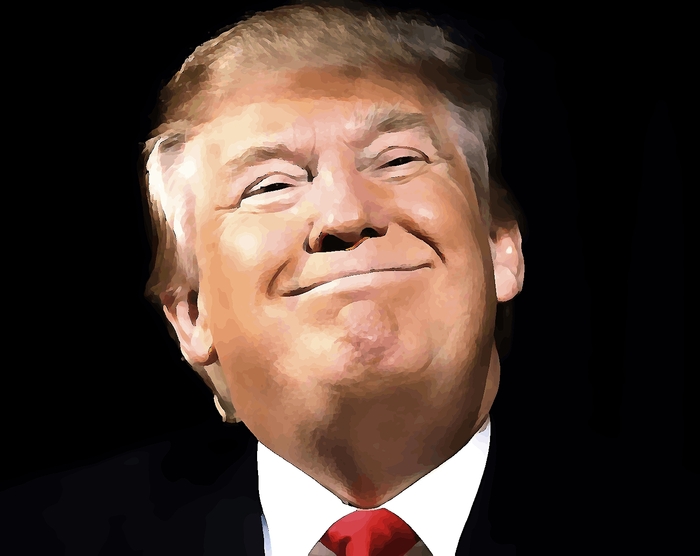
Edward Lorenz, the pioneer of chaos theory, famously suggested that the flapping of a butterfly’s wings in Brazil could set off a tornado in Texas. Even a tiny disturbance, he argued, can have huge effects in a complex system governed by non-linear relationships.
But since 2016 we’ve seen the opposite. Donald Trump, far from being a butterfly in the Amazonian rainforest, is the 800lb gorilla right at the centre of the world. If anyone can cause chaos — in practice as well as in theory — it’s him.
Elected, unexpectedly, to the most powerful job in the world, he has spent the past 2½ years not just flapping his wings, but wildly swinging his fists, as if intent on starting a global tornado. And yet the consequences of the gorilla’s antics have been remarkable for their smallness. Prophesies of political and financial disaster have proved wrong. Until now.
August is the month when a large proportion of the people in the northern hemisphere (about 90% of the world’s population) either go on holiday or work half-heartedly while listening to Test Match Special. Unfortunately, history consistently refuses to go on vacation in August. Indeed, I increasingly suspect history of having become a workaholic.
This August has produced a mighty storm of geopolitical and economic mayhem. You can consider each local difficulty in isolation, if you like. Alternatively, consider the possibility that these are all delayed consequences of the 800lb gorilla’s fist-swinging. It has taken longer than expected for him to smash what is sometimes (misleadingly) called the liberal international order or the Pax Americana. But he has done it now. Or so it seems.
In Asia, Hong Kong teeters on the brink of disaster. As the pro-democracy protests continue, the Chinese president, Xi Jinping. weighs up whether or not to send in the People’s Armed Police from the mainland. This has the potential to be another Tiananmen Square massacre. Meanwhile, North Korea is firing rockets like a drunk teenager on Bonfire Night. War over Kashmir looms. And in the Middle East, rumours abound of a showdown between Iran, and Israel and its allies.
These political risks coincide with multiple signs of a global economic slowdown. Britain’s economy shrank in the second quarter, but don’t blame Brexit because so did Germany’s. Trade within the eurozone is down sharply.
Most worrying is the fall in long-term interest rates. Last week the yield on 30-year US government bonds fell below 2% for the first time. Long-term bond yields are now below short-maturity debt — an inverted yield curve, in the argot of Wall Street.
Such an inversion has preceded every US recession since the 1960s. The fact that
$16 trillion (£13 trillion) of bonds around the world have negative yields — you are guaranteed to lose some money on the investment, but at least you know how much you’ll lose, unlike with the stock market — tells us that something is badly amiss with the world economy. The only people who seem not to have noticed are American consumers, still shopping till they drop, according to the latest retail sales data.
So is chaos coming to Main Street? Back to Professor Butterfly. Lorenz was one of those self-effacing geniuses you often meet at the Massachusetts Institute of Technology (MIT). His discovery of the butterfly effect came in 1961, when he was experimenting with a computer model he had designed to simulate weather patterns. He was repeating a simulation he had run before, but rounded off one variable, from 0.506127 to 0.506. To his amazement, this minute change drastically transformed the simulated weather generated by the computer.
Almost no one read Lorenz’s path-breaking paper on the subject when it was published in 1963 in the Journal of the Atmospheric Sciences as “Deterministic Nonperiodic Flow”. It was not until nearly 10 years later that Lorenz translated his insight into layman’s language in a lecture with the title: “Predictability: Does the Flap of a Butterfly’s Wings in Brazil Set off a Tornado in Texas?”
“Two particular weather situations,” he argued, “differing by as little as the immediate influence of a single butterfly will generally after sufficient time evolve into two situations differing by as much as the presence of a tornado.”
In his 1972 lecture, however, Lorenz added an important caveat: “If the flap of a butterfly’s wings can be instrumental in generating a tornado, it can equally well be instrumental in preventing a tornado.” In Lorenz’s view, this was what made long-range weather prediction so difficult.
The same applies even more to economic forecasting. In 1966, the Nobel prize-winning economist Paul Samuelson joked that declines in US stock prices had predicted nine of the past five US recessions. I know economists with much worse batting averages. They predict a financial crisis every year and once a decade are right, at which point the media hail the stopped clock as a prophet. Economic forecasters are far worse at their jobs than weather forecasters.
Of 469 downturns in national economies since 1988, according to Andrew Brigden of Fathom Consulting, the International Monetary Fund had predicted only four by the spring of the year before they began. As for the great financial crisis of 2008-9, just a handful of economists saw it coming.
That means that we should treat with scepticism those who confidently predict a US recession next year. And, if there is one, we should treat with even more scepticism those who blame it on Trump.
The real point about the gorilla effect, remember, is how little the swinging of the gorilla’s fists has really mattered since he climbed atop the White House. Just like the butterfly, the gorilla may have prevented as many tornadoes as it caused. Indeed, Trump’s economic policies have almost certainly been, on balance, more conducive to economic growth than the opposite. True, he has imposed tariffs, but he has also presided over a sugar-rush of deregulation, deficit spending and monetary easing.
As the sugar wears off, and America follows the world into a slowdown, if not a recession, all Trump’s opponents will have an incentive to blame him. But perhaps the truth is that the gorilla and the butterfly are not so very different in our complex, interconnected world. The only difference is that the gorilla insists it’s all about him.
“You have no choice but to vote for me,” Trump declared at a rally in New Hampshire on Thursday, “because [otherwise] your 401(k)s [retirement savings plan] — down the tubes. Everything’s going to be down the tubes. So whether you love me or hate me, you’ve gotta vote for me.”
That’s a line that could come back to haunt Trump if everything goes down the tubes before November next year, when Americans will decide if he’s a one or two-term president. But if he gets lucky, and the economic weathermen are wrong again, it might just get the 800lb gorilla four more years of fist-swinging.
(COMMENT, BELOW)
Niall Ferguson's latest book is "The Square and the Tower: Networks and Power from the Freemasons to Facebook." (Buy it at a 50% discount by clicking here or order in KINDLE edition at a 74% discount by clicking here). He is the Milbank Family Senior Fellow at the Hoover Institution, Stanford University, and a senior fellow of the Center for European Studies, Harvard, where he served for twelve years as the Laurence A. Tisch Professor of History.


 Contact The Editor
Contact The Editor
 Articles By This Author
Articles By This Author